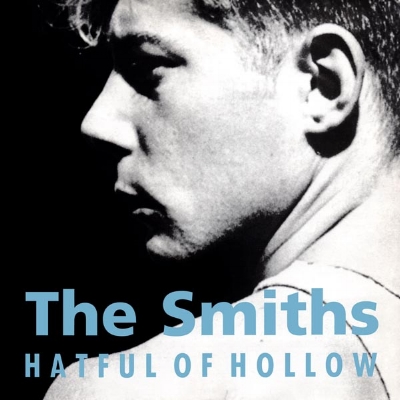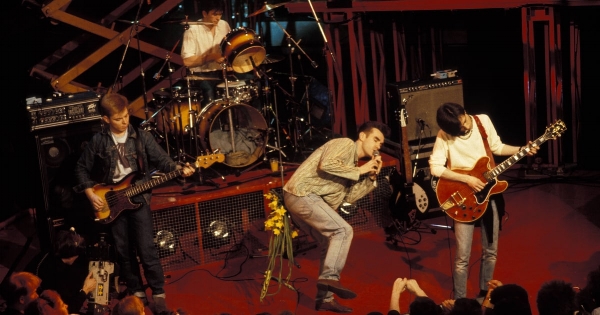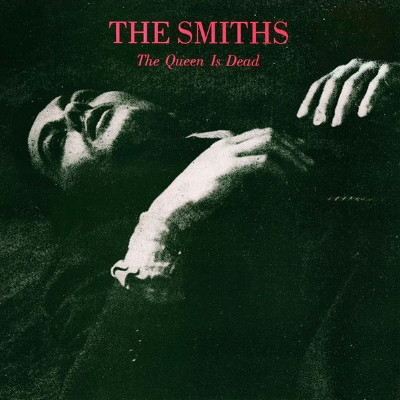There is A Light that Never Goes Out: A Retrospective of The Smiths
Click below on the streaming service of your choice to listen to the playlist as your read along.
There are few bands as beloved and beleaguered as The Smiths. There are also few acts that have achieved a legacy like theirs from a career that spanned a mere five years. Blending the distinct vocals and personality of singer Steven Patrick Morrissey, the incredible guitar playing of Johnny Marr, and their ability to write impeccable, creative pop songs blended with dark, emotive, sardonic lyrics, The Smiths burned brightly before flaming out under the weight of their discordant personalities.
Morrissey and Marr knew each other as teenagers, having been introduced by future member of The Cult, Billy Duffy. They came together a few years later in 1982 at Marr’s prompting and began working on material together. They spent that year with different band members and recording demos, playing their first live show in the fall. Mike Joyce won the gig as the permanent drummer and by the end of the year Andy Rourke had settled in on bass. They tried to get signed locally in Manchester and, without luck, travelled down to London where Rough Trade agreed to record and release their first single, “Hand in Glove.” Though it didn’t reach the charts, the song did well enough to gain them some press and an appearance on the John Peel show. That boosted interest enough for Rough Trade to sign them and they were on their way to recording their first album, just one year after forming and with only a few live shows under their belt.
Rourke, Marr, Morrissey, Joyce
“This Charming Man” \ Non-album single (1983)
“Reel Around the Fountain”; “Pretty Girls Make Graves”; “Still Ill”; “What Difference Does It Make?” \ The Smiths (1984)
During a time in which keyboards and dance music were dominant, a guitar-led pop band went against the grain. However, with songs like their second single, “This Charming Man,” The Smiths would not be denied. From the bright guitar intro and jaunty melody juxtaposed with Morrissey’s emotive vocals, The Smiths, named purposely to convey boredom and mediocrity, gave notice they were going to be anything but ordinary. The song also touched on the gay and homo-erotic themes that would gain the band attention and controversy.
Early in 1984 they released their next single, “What Difference Does It Make?” in tandem with the release of their debut, self-titled album. The single was again a jaunty and pop-infused melody offset by dark-tinged lyrics, this time including falsetto vocals, a technique Morrissey would draw up upon often through their career. The single grew their success and led to solid sales and attention for the album, which debuted and peaked at #2 on the UK album chart.
The Playlist
The Smiths
This Charming Man
Reel Around the Fountain
Pretty Girls Make Graves
Still Ill
What Difference Does It Make?
Heaven Knows I'm Miserable Now
Please Please Please Let Me Get What I Want
How Soon Is Now?
The Headmaster Ritual
What She Said
That Joke Isn't Funny Anymore
Barbarism Begins at Home
Bigmouth Strikes Again
The Boy with the Thorn in His Side
There is a Light that Never Goes Out
Panic
Ask
You Just Haven't Earned It Yet Baby
A Rush and a Push and the Land Is Ours
Death of a Disco Dancer
Girlfriend in a Coma
Stop Me if You Think You've Heard This One Before
Last Night I Dreamt that Somebody Loved Me
Morrissey
Everyday is Like Sunday
November Spawned a Monster
Sing Your Life
Johnny Marr
Get the Message
Down on the Corner
The Messenger
The Tracers
The first album was the band’s most straightforward and accessible, with pop-rock songs laced with Marr’s light and catchy riffs. “Reel Around the Fountain” led the album as a longer, mid-tempo and moody track, and was one of the songs with dark themes that invited controversy due to lyrics like, “It's time the tale were told / Of how you took a child / And you made him old,” followed by references of being slapped on a patio and “Fifteen minutes with you / Well, I wouldn’t say no.” Some accused the band of courting paedophilia, which was vigorously denied. The song, “Pretty Girls Make Graves” was less jaunty and rode a catchy bassline, while “Still Ill” captured the energy and lament that marked album’s mood – always with the draw of the inventive and catchy guitar licks of Marr. The album included the prior singles “Hand in Glove” and “This Charming Man” and made for an eminently listenable LP from start to finish.
“Heaven Knows I’m Miserable Now” \ Non-album single (1984)
“Please Please Please Let Me Get What I Want” \ B-side (1984)
“How Soon Is Now?” \ Non-album single (1985)
As was often the case for acts of this era, especially in the UK, there was a flurry of singles before the next album was released. The first was, “Heaven Knows I’m Miserable Now,” which more than their prior songs was the first to capture the essential Smiths sound of a bright, catchy pop song along with morose and depressing lyrics, which I’d quote if the song’s title didn’t say it all. The next single was, “William, It Was Really Nothing,” but it was the B-side, “Please Please Please Let Me Get What I Want,” that achieved the greater legacy, especially after the Dream Academy’s cover was used in the 1986 movie, Ferris Bueller’s Day Off (the instrumental version was used in the movie itself) and then The Smiths’ version included the same year in John Hughes’ other blockbuster, Pretty In Pink. The song was also notable as being one of the shorter and slower offerings from the band, offering a different and more nuanced take on their sound and a starker interplay between Marr’s guitar and Morrissey’s voice.
Late in 1984, Rough Trade issued a collection of the band’s singles, B-sides, and Peel recordings, Hatful of Hollow. The album reached #7 in the UK chart, showing that while The Smiths were not driving success with singles their music had appeal and was building a strong audience.
Part of the band’s appeal was Morrissey’s intriguing style. Though sexually ambivalent (usually assumed to be gay, he remained coy about his sexual preferences and typically declare himself as celibate) his emotive, vulnerable, flamboyant style (per his pompadour hairstyle, unbuttoned print shirts, and a bouquet of flowers hanging out the back pocket of his pants during shows) and appealing looks drew a strong following of young admirers regardless of gender. He was a regular of the teen magazines and music press in England which devoted lots of ink towards The Smiths. Morrissey’s voice was also distinctive. Certainly competent, effortless, and with some range and strength, his ability to create moods of ambivalence or exultation, sadness or elation, and without ever sounding dull, brought many listeners to The Smiths’ sound. However, his persistent moroseness and crooning also alienated many a listener too.
Before releasing their second album, two more singles were released in 1985: “How Soon Is Now?” and “Shakespeare’s Sister” (a name later adopted by the ‘90s pop duo of Siobhan Fahey and Marcella Detroit). Neither created the commercial breakthrough the band was seeking, both topping out in the mid-20s on the UK singles chart. However, the lack of sales belied the influence of “How Soon Is Now?” It had first appeared as a B-side to “William, It Was Really Nothing” and was included on Hatful of Hollow before its ’85 release as a single. “How Soon Is Now?” is generally recognized as the band’s signature song and one of the most significant singles of the decade. My local alternative radio station in Toronto, CFNY, listed it in 1991 as the #1 song of all time as voted by the station’s listeners (it dropped to #2 in the 1999 list). The track was distinguished once again by Marr, providing one of the most recognizable and unique guitar tracks of the modern rock era. At almost seven minutes in length it was not the most standard single, rife with echoey guitar and drums and a dark, swirling mood marked by Morrissey’s offhand and vulnerable vocals – one of his best performances to date. The song jumped out on the radio and was unlike anything of its time or before, and even stood apart from the rest of The Smiths’ discography. Though it didn’t sell commensurate to its impact and influence, “How Soon Is Now?” established The Smiths as one of the leading bands of the decade. Admittedly (for me at least), the song has worn out its welcome over the years (not helped by Soho’s sampling of it in 1990 for the minor hit, “Hippychick”), so it can be hard to re-create the sense of originality and excitement that accompanied its arrival, but it is an unmistakable landmark in the history of modern rock music.
The Smiths perform and Morrissey, with flowers in his pocket
“The Headmaster Ritual”; “What She Said”; “That Joke Isn’t Funny Anymore”; “Barbarism Begins at Home” \ Meat Is Murder (1985)
By the time of the second album, after releasing seven singles, an album, and a compilation album, it seemed like The Smiths had been around longer than the mere two years of their recording career (and for the many who found their bleakness and Morrissey’s personality tiring, probably longer). Meat is Murder arrived not only as a political statement, but as a bold assertion of the band’s musical brand. Marked by lyrics promoting vegetarianism (the title track) and against corporal punishment at home and in school (“The Headmaster Ritual” and “Barbarism Begins at Home”) the album was as dark and moody as its predecessor but with music and vocals far more sophisticated and varied. Less bright and jangly, the album was a deeper and more satisfying listen that demanded the listener’s undivided attention. This album was my first purchase of The Smiths and many listens imprinted it on me as an important and moving piece of art.
Johnny Marr, in particular on this LP, asserted himself as one of the strongest song writers and guitar players of his generation. The guitar playing left you breathless despite nary a solo to be found. Every song rode on his playing (with some nice bass work to play off it, such as in “Barbarism Begins at Home”), making the album dependent on every whim of Marr’s hands. “What She Said” was a breathless run of strumming guitar and energy, and though Morrissey’s voice rode shotgun, it was the frenetic pace and accents from Marr that made you jump from your seat (accompanied with some nice drumming from Joyce). As new wave and synth-led music was reaching its zenith that year, such guitar-led music was a nice offset and helped set The Smiths up to be one of the more successful and distinctive bands of the decade’s second half when the guitar re-asserted itself in popular trends.
The singles were, “Barbarism Begins at Home,” and then, “That Joke Isn’t Funny Anymore,” a lush and beguiling ballad that presaged their later style, once again leveraging the juxtaposition between music and lyrics that was the band’s signature. Neither single charted well (or at all), yet Meat Is Murder brought the band their first and only #1 LP in the UK, proving The Smiths were a leading act of the era. They weren’t yet garnering much attention outside of the UK, though were developing a strong following in the US and Canada among alternative and college music formats. The North American release included “How Soon Is Now?” as a hidden track on the album, leading the second side.
“Bigmouth Strikes Again”; “The Boy with the Thorn in His Side”; “There Is A Light that Never Goes Out” \ The Queen Is Dead (1986)
Though only reaching #2 in the UK, the next album, The Queen Is Dead, gave The Smiths greater international success. It reached #70 in the US, #29 in Canada, and #30 in Australia. The band’s penchant for long song titles especially came to bear on this LP. There was also another slight change in sound and tone as the album rocked a little more and lessened the moody atmospherics of Meat Is Murder.
Emblematic of the fresher and accessible sound of the album were the lead singles, “Bigmouth Strikes Again,” and “The Boy with the Thorn in His Side.” It seemed to me that year you could not go anywhere without hearing those songs – especially “Bigmouth” – so it was surprising that neither cracked the top 20 on the UK charts (and perhaps indicative of the change I had made in my listening habits, that I was less attuned to the top selling acts). I received the 12” single for, “The Boy with the Thorn in His Side,” at Christmas and listened to it often. The album would be the #2 album of 1986 on CFNY, edging my beloved New Order’s Brotherhood and coming in behind Peter Gabriel’s album, So. The singles were marked by Marr’s guitar, again strumming at furious paces to take them through catchy and enervating melodies. While “Bigmouth” may have been the more distinctive song of the year – similar to “How Soon Is Now?” it had a different feel than other music of the time and Morrissey’s voice in particular was on another plane – “The Boy with the Thorn in His Side” was simply a beautiful and joyous song musically, though of course the lyrics referenced hatred and lies, but hey, Morrissey yodeled for good effect!
The album was also notable for another light and lovely pop song marked with dark and sordid lyrics, “There is A Light that Never Goes Out.” Once again set to intoxicating acoustic guitar, Morrissey put a positive spin on a grim spectacle, “And if a double-decker bus / Crashes into us / To die by your side / Is such a heavenly way to die.” For The Smiths, it appeared things were, as ever, playing between the dark and the light.
The inside gatefold of The Queen is Dead, along with promos for the LP and tour, featured photos of the band in front of the Salford Lads Club. The photos by Stephen Wright and location have since become iconic in both The Smiths’ and UK music lore. In 2019, during a visit to Manchester, I was not above making a trek to the out of the way spot to capture my own photo.
“Panic”; “Ask” \ Non-album singles (1986)
“You Just Haven’t Earned It Yet, Baby” \ The World Won’t Listen (1987)
Before 1986 concluded the band released two more singles, “Panic” and “Ask,” which fared better than any released before. These singles included Craig Gannon on guitar, who had been brought in briefly as a replacement for Andy Rourke on bass who had been turfed for his heroin use. When Rourke was allowed back into the band Gannon stayed on (he would leave the band by the end of the year). This episode revealed the underlying and growing challenges the band was facing. They were battling their label over legal and promotional issues and the album had been delayed in being released as a result. Marr was tired of constant touring and the associated lifestyle and was feeling the ill health effects. Additional to Rourke’s drug use there was discord in the ranks since, officially, the only members of the band were Morrissey and Marr. Rourke and Joyce were employees under contract and thus never officially recognized as band members. This naturally led to a difference in status and income – perhaps fair since Morrissey and Marr wrote all the songs – but also problematic given the extent to which the rhythm section had contributed to the overall sound. A tour of the US was cut short by the band, cancelling the remaining four shows. Things were looking as bleak as their lyrics.
The frustration of not having achieved the success The Smiths felt they deserved – they still didn’t have a top ten single – was noted in the title of the next compilation of singles and B-sides, The World Won’t Listen, released in February of 1987. It went to #2 in the UK, same as two of their three albums to date. It included a song that was intended to be a single, “You Just Haven’t Earned It Yet, Baby” (also a reference to their success shortfall?) but was passed over for what was released as the next single that year, “Shoplifters of the World Unite.” In America, an expanded version of the compilation was released as a double-album, Louder than Bombs (it included Hatful of Hollow material, which had been as yet unreleased stateside). It reached #62 in the US for their best result yet and was released later in the UK.
“Sheila Take a Bow” was the next single and delivered The Smiths their first top ten single in the UK. Musically, this period continued to display the band’s ability to write great songs. “Panic” and “Ask” were immensely catchy, and the addition of Kirsty MacColl on, “Ask,” gave the vocals a new dimension.
“A Rush and A Push and the Land Is Ours”; “Death of a Disco Dancer”; “Girlfriend in A Coma”; “Stop Me If You Think You've Heard this One Before”; “Last Night I Dreamt that Somebody Loved Me” \ Strangeways, Here We Come (1987)
The Smiths problems came to bear in 1987. After recording the next album Marr left the band briefly due to a combination of needing a break and misunderstandings with Morrissey, who was unhappy with Marr working with other artists. After reuniting, the disagreements continued, this time over the musical direction of the band. Marr wanted to branch out into new styles and Morrissey wanted to hew more closely to their R&B roots. By the time the LP was released in the fall, the band had officially declared themselves over.
It was a shame it ended up that way, because who knows what the band might have achieved if they’d lasted longer? Yet, their short lifespan also contained The Smiths’ career to a tight list of four utterly fantastic albums and an impressive list of singles. Perhaps their short career saved them the typical drift and loss of quality most bands inevitably run into?
The new – and final – album, Strangeways, Here We Come, was a return to the moodiness of Meat is Murder and was their most varied and lavish LP. Again, with more words per title than most albums, the songs moved through moody and dramatic turns, and this time the music and lyrics were more thematically cohesive. The obvious exception was, “Girlfriend in A Coma.” One of the band’s purest pop songs, it delivered a light, happy melody while Morrisey intoned, “Girlfriend in a coma, I know / I know it’s serious.” The album had several engaging and spirited moments, and the opening track, “A Rush and A Push…,” had a keyboard rhythm that was a welcome change to the band’s sound. The later half of the LP was where the band delivered some of its biggest and most ambitious music, with “Stop Me…,” “Last Night…,” and “Paint A Vulgar Picture” all providing epically moving tracks.
I think Strangeways was The Smith’s best album and, buoyed by their increasing exposure at that point, it reached their top peak of #55 in the US while once again reaching #2 in the UK. “Girlfriend” was the LP’S only pure radio-friendly single and reached #13 in the UK. As usual, the other singles didn’t fare as well – indeed, The Smiths would never be a singles band despite the impressive list of songs in their repertoire, but their albums were all widely embraced.
“Everyday Is Like Sunday” \ Viva Hate \ Morrissey (1988)
“November Spawned a Monster” \ non-album single \ Morrissey (1989)
“Sing Your Life” \ Kill Uncle \ Morrissey (1991)
Morrissey did not break stride after the demise of The Smiths, channeling his ennui into an impressive solo career that would shine brighter than that of his band. His first album, Viva Hate, was released only six months after the final Smiths album. It featured the hit, “Suedehead,” which reached #5 in the UK charts while the album went to #1 – both surpassing the peaks of any Smiths release. The second single from that album was, “Everyday Is Like Sunday,” an incredible, expansive, and utterly entrancing single – one of my all-time favourite songs.
The singer followed up that debut with one success after another in both albums and singles. Given the distinctiveness of his voice and his love for the R&B and pop styles, his albums sounded like more Smiths releases, though the pop element carried through stronger and thus the greater chart success. By 2023, he has released thirteen solo albums, three of which have reached #1 and all have cracked the top ten in the UK. He has also had ten top ten singles, though is yet to score that elusive #1 tune. He’s not achieved as much success outside of the UK, other than on specialty charts such as the US Modern Rock chart.
“November Spawned A Monster” and “Sing Your Life” are two of his stronger singles. They are two different styles and show that Morrissey has been willing to vary his sound to some extent, and that he simply has a fantastic grasp of catchy and emotionally laden songs. Over the years his politics, habit of cancelling shows and tours, and his whining and lecturing about various topics has alienated many. Yet, he still has an ardent following, as his sales indicate, and the legacy of The Smiths will make sure he’s always respected as an artist. I saw him perform at the 2022 Cruel World festival in California, where he drew a large audience as the headliner. In recent years his recording career has been more uneven – he was recently dropped by his label – and he has made news more through his behaviour than his music. Despite the strength of his solo material, he has lacked the chemistry of working with Marr to provide an extra boost to his music.
“Get the Message” \ Electronic \ Electronic (1991)
“Down on the Corner” \ Boomslang \ Johnny Marr (2003) – YouTube Music only
“The Messenger” \ The Messenger \ Johnny Marr (2013)
“The Tracers” \ Call the Comet \ Johnny Marr (2018)
Johnny Marr, as he’d started during his time with The Smiths, became a gun for hire. He wrote, played, and produced for a multitude of other acts, including Billy Bragg, Talking Heads, Bryan Ferry, The The (Mind Bomb in 1989 & Dusk in 1992), Pet Shop Boys, Beck, Tom Jones, Modest Mouse in the 2000s, Oasis, Pearl Jam, and guesting in Neil Finn’s Seven World’s Collide projects.
His first major project as a principal contributor was in the all-star band, Electronic, formed with Bernard Sumner of New Order. Neil Tennant and Chris Lowe of Pet Shop Boys also appeared on the initial single and two other tracks on the first album. Electronic’s first single, the fantastic, “Getting Away with It,” was in late 1989 and was followed by a full album in early ‘91. “Get the Message” was the strong lead single from the LP. Marr and Sumner’s ability to write danceable, guitar-laden songs made for a great album. They followed up with two more strong albums over the remainder of the 1990s.
Marr formed his own act, The Healers (including Zach Starkey on drums), in 2003 and issue an album, Boomslang, which featured the very good singles, “The Last Ride” and “Down on the Corner.” The next solo material from the guitarist was under his own name in 2013 with the album, The Messenger. It has been followed by three more, Playland (2014), Call the Comet (2018), and Fever Dreams Pts 1-4 (2022). I saw Marr perform at the comfy confines of The Velvet Underground in Toronto in 2018, which was a wonderful experience. His music is usually in the guitar-driven Britpop style, and has not been able to achieve success nearing that of The Smiths or Morrissey. However, his contributions to anyone’s music invariably improves it, and his own albums are solid and enjoyable listens.
The Smiths are recognized as one of the most important and influential modern rock acts. Their tenure was short, but they created a style of modern rock that offered something different to the synth-laden sounds of the 1980s and set the stage for the return of guitar rock in the 1990s. Though their sales didn’t convey the depth and extent of their fan base and critical reception, The Smiths undoubtedly were an immense act of their era. Unfortunately, they broke up just as UK acts of the early ‘80s (e.g. The Cure, New Order, Depeche Mode) broke through in the US. If Morrissey and Marr were to reunite today, they would sell out stadiums. Their songs are still routinely played on the radio and they have spawned an impressive catalogue of compilations and re-releases, many of which have been more successful than the originals. For example, “This Charming Man” was re-released for a greatest hits package in 1992 and gave The Smiths their top chart placement, with a #8 peak, while the album itself was their second #1 LP. In 2021, the film, Shoplifters of the World, involved a plot (loosely based on a real-life event) in which four Denver teens in 1988 react to the breakup of the band and force a local rock radio station to play The Smiths all night.
Personally, The Smiths were as much a part of my teen years as any other act, though I was never as taken by them as other bands. I loved their music, but the personality of Morrissey and the teen angst appeal of their music kept me from diving in. It seemed everyone I knew listened to them and they were staples at high school parties and dances in Toronto, so it was surprising for me to look back and see just how overlooked they were in North America. And yet they weren't - like so many highly successful British bands from the UK, a lack of chart success didn't mean they didn't have a substantial and die-hard following. Read this take on Morrissey's first appearance and the associated pandemonium he brought to a bewildered Johnny Carson on his first Tonight Show appearance in 1991.
Morrissey is one of the most iconic and unique singers of his generation. His voice is effortless and pure, ranging from a falsetto to a subtle tenor that allowed him to convey the world-weariness and dark emotion of his lyrics. Those lyrics were paired best with the inventive and catchy guitar work of Marr, who is easily one of the best players of the modern rock era. Yet, while Morrissey has had greater success solo, its the combination with Marr that produced the greater legacy. The Smiths, who could elate, depress, frustrate, and ultimately make you dance or nod your head to their infectious groove, were one of the most consistent and impressive acts we’ve been privileged to know.
UPDATE May 2023: The Smiths have been in the news due to the untimely passing of Andy Rourke at age 59 due to pancreatic cancer. The traditional focus on Morrissey and Marr and the relegation of The Smiths’ rhythm section to a lesser status led to Rourke and Joyce being oft ignored. Which was a shame, as the lively bass and drums in The Smith’s music was as integral a part of the sound as the vocals and guitar. Among the obituaries and acknowledgments, it has been nice to hear the accolades from Rourke’s band mates and others, recognizing his talent and contributions.




















